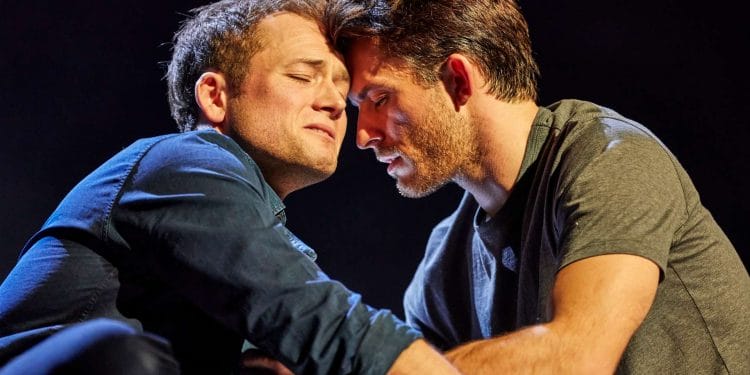 Onomastically speaking, both the provocative title and the reputation of those involved have ensured that Mike Bartlett’s Cock at the Ambassadors Theatre was nearing being sold out for its entire run even before the curtain had risen for the first preview. Originally staged at The Royal Court in 2009, audiences then may have tussled with the concept of labelling which modern audiences will certainly be more aware of today.
Onomastically speaking, both the provocative title and the reputation of those involved have ensured that Mike Bartlett’s Cock at the Ambassadors Theatre was nearing being sold out for its entire run even before the curtain had risen for the first preview. Originally staged at The Royal Court in 2009, audiences then may have tussled with the concept of labelling which modern audiences will certainly be more aware of today.
John has fallen in love with a woman, they’ve slept together and he can see a future for both of them, but he’s uneasy about it and needs to talk to someone. That someone is his long-term boyfriend whom he shares a home with.
The play is essentially the to and fro of John deciding which partner to continue with. This may not be as easy as it sounds, one offers the once unimaginable prospect of raising a family and living what some would consider a conventional life, the other is safe, comfortable and familiar.
The key aspect of Cock though is the three other characters (all of whom are unnamed) insist that John finds a way to label himself. Is he gay, straight, bisexual, asexual, pansexual and so on? For John, and many of those watching, that kind of pigeon-holing seems too far down the list to matter.
Director, Marianne Elliott reflects the fluidity of sexual attraction in a wonderful physically theatrical way. Jonathan Bailey (John) twists and contorts his body – often accompanied by some beautiful compositions by Femi Temowo – as if dodging bullets from the other characters, each of them with their own selfish reasons for needing him to make choices.
Merle Hensel’s design is simple but effective, the entire play taking place with a cylindrical-esque backdrop of brushed stainless steel. It means that with every scene and every line spoken, the audience see slightly altered images of what’s happening reflected back to them.
Jonathan Bailey, who worked with Marianne Elliott in the recent West End hit production of Company, gives a breathtaking tour-de-force performance. On stage throughout, Bailey succeeds in surfacing all of John’s misgivings and concerns. Anger, worry and confusion are all etched into this performance and it leaves the audience becoming champions of the character.
Taron Egerton plays the boyfriend, it’s a complex character and Egerton approaches it well, though it does feel as if he’s camping it up on occasion. The title alludes to the final few scenes which are intended to resemble a cock fight, here Egerton excels, playing each move carefully for maximum effect.
Also notable in these scenes in particular is Jade Anouka, playing Cock’s version of ‘the other woman’. It’s a strong and fiery character, that Anouka pulls off with aplomb. Completing the cast, and providing an outsiders point of view is Phil Daniels, bringing some perfectly timed comedy moments.
Because despite the fairly serious subject matter, Cock is a seriously funny play, with some shockingly funny one liners; “I do love all of you…even the fat bits”. Indeed, the ‘cock-fight’ scenes are vicious only in respect of the sharp tongued exchanges. By contract, the love scenes become alluringly erotic, even though the cast remain fully clothed and often 2 metres apart (though not for the reasons we’ve become accustomed) on a two-directional revolve.
Bartlett’s script does perhaps sacrifice exploring the characters and their motivations in order to achieve these viciously witty exchanges, but it is cleverly enough written to perhaps alter audience viewpoints more than once during the performance.
Those seeing Cock for its name, or the names attached to it, are in for a treat. Bartlett’s script was perhaps ahead of its time, but perfect for today, while Marianne Elliott’s direction makes for a seriously beautiful piece of theatre. It is, however, Jonathan Bailey’s performance that will stick out in people’s minds.
























Comments 6